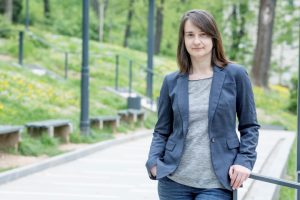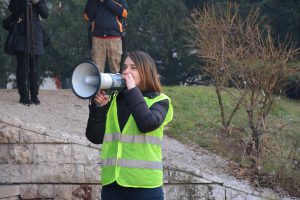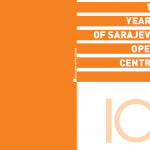Emina Bošnjak, Executive Director of SOC, marking 10 years: Hard Work Pays Off
For the tenth anniversary of SOC Emina Bošnjak, the executive director of the organisation, talked about the organisation’s achievements, the importance of fundraising, team dynamics in SOC and their plans for the future.
Interviewer: Masha Durkalić
 Ten years is a long period to get things done. Are you happy with your achievements so far? Do you think you could have done more and is there something you haven’t tackled yet? How do you look upon the ten years of SOC?
Ten years is a long period to get things done. Are you happy with your achievements so far? Do you think you could have done more and is there something you haven’t tackled yet? How do you look upon the ten years of SOC?
EMINA BOŠNJAK: Yes, we’ve done a lot. In the past ten years we’ve released over 100 publications, and I think it’s a good indicator of the amount of work we’ve done. The number of trainings, seminars, exhibitions, book events, meetings and other activities that are the bread and butter of a civil society organisation can also be a useful indicator for anyone who is interested in the work of Sarajevo Open Centre. Looking back, I don’t think we could have done more, as we’ve always worked very hard, pushing the limits of our human and other resources. If we look at individual activities, we’ve done more than necessary. I say this as someone who has occupied all positions within the organisation, from a coordinator to a program manager. However, since quantity doesn’t necessarily ensure quality, in hindsight we realise there are things we could have done better, faster or in a different way. We also could have skipped some of them, but it’s all part of the learning curve and I highly doubt there has ever been an organisation with the perfect track record.
As for advocacy work, our priority lies in pushing for legal regulation of same-sex partnerships, gender recognition, political participation of women and strengthening institutional gender mechanisms.
I’ve also learned it’s important to speak about the results, and I can say I’m very happy with what have achieved. Over the past three years we’ve been using a set of 20 clearly defined, measurable indicators to measure our results on an annual level. The indicators show that we have not only met but also exceeded most of our set goals. These include the rise in the number and percentage of people from the LGBTI community who are satisfied with our legal and peer counselling services, the number of successful advocacy initiatives related to the rights of women and LGBTI people, changes in media coverage of LGBTI issues, and more visitors at the Merlinka Film Festival in Sarajevo.
There, now I sound like a proper director. (laughs)
Ten years is also a long period in terms of securing funding. SOC has managed to survive, despite constant fluctuations in the funds available to civil society organisations in BiH and the fact that SOC does advocacy work, which is uncommon here. How have you managed to secure the necessary funds? What difficulties have you encountered?
EMINA BOŠNJAK: Fundraising is a very demanding process, one that is necessary to survive as an organisation, implement your activities and achieve your goals. I haven’t been at SOC from the very beginning, so I hope I’m correct in saying that SOC has always strived to be more than an organisation simply publishing promo material; there’s nothing wrong with it per se, but it’s often far from enough. Nowadays, no one can afford the luxury of trying to bring about social change in BiH on a purely volunteer basis, so the biggest challenge is to find the funds that pay for the salaries of all employees and ensure adequate working conditions. We’ve always had good project ideas in all the areas we cover, and we’ve managed to procure funds for their implementation – for which we are eternally grateful – but some expenses cannot be covered by project money, even though they are crucial for the life of an organisation. Thankfully, there are donors such as the Swedish International Development Cooperation Agency (SIDA) and the Open Society Foundations. In my opinion, these donors played a crucial role in the development of SOC because they provided us with core funding, therefore enabling us to develop our organisational capacities, be flexible in our advocacy work, react when policies and laws we’ve been advocating for finally come into focus, or prevent important policies from being reversed, and provide co-funding for projects that need it.
I have to point out that SOC has had just one project financed by a local institution and this took place before we started to systematically address human rights of women and the LGBTI population. We didn’t chase after projects that weren’t in line with our overall strategy, even though some of them were quite tempting and we personally wished we could pursue them. I hope the first issue is resolved soon, not just for our sake, but also for the sake of the vast number of organisations dealing with human rights. As for the latter issue, I honestly hope we never have to compromise our principles in order to stay afloat.
You have plenty to brag about as well. What are SOC’s greatest achievements and why? Has your effort in making these things happen paid off?
EMINA BOŠNJAK: Our effort has definitely paid off. It’s difficult to distinguish between the bigger and the lesser victories, as they are all equally important. I feel more comfortable talking about the achievements I’ve witnessed since I’ve been at SOC, but I’m sure there were many before my arrival as well. The first thing that comes to mind is the SOC team celebrating the first thematic session on LGBT rights held in one of the parliaments in May 2015. We’d managed to achieve something that many saw as a pipe dream: no way is that ever happening, LGBTI people are nowhere near their list of priorities, like hell are they talking about us. Yet, despite the pessimism, we gave it a go – and it happened! The second thing is this year’s Merlinka Film Festival: an incredible number of visitors, a fantastic atmosphere that made us giddy with excitement and the fact that Merlinka was the most important cultural event of the month. The House of Representatives of the Parliament of FBiH adopted the initiative to use gender-sensitive language. This initiative was a follow-up activity of our Equality Academy, and its adoption was a big deal. We were also the only civil society organisation that contributed to the amendments of the Law on Sports. The amendments address equal participation of women in the Sports Council, gender responsible budgeting and prohibition of discrimination on all grounds including disability, age, sexual orientation, gender identity and sexual characteristics. This is also a huge success. We’ve played a part in drafting numerous amendments and policies: the Anti-Discrimination Law of BiH, amendments to the Criminal Code of FBiH, the decision to design an Action Plan for Equality of LGBT people in BiH, etc. You can read more about it in this publication.
I’ve heard people say SOC functions as some sort of a cult. It may sound insulting at first, but I choose to look at it from a different point of you. I think it reflects an important truth about SOC: that there is a set of core values, principles and rules in place, and a strong sense that we are building something together. It contributes to the cohesion of the team, regardless who is in it.
There are also smaller victories that propel us forward. It’s a great success to have parents of young trans people come to us for advice and help, because they know we have the right information. Or when a person with an already impressive CV includes the School of Feminism “Žarana Papić”, right after listing their formal education.
We should also note the stability of the team, because teamwork is very important in civil society organisations. How did you build your team and your capacities over the years?
 EMINA BOŠNJAK: A lot of it has already been described in the advice column! (laughs) SOC has undergone changes in personnel and it’s nothing unusual. What sets SOC apart is that former members who have moved on professionally are still involved in the work of SOC and are there to help and support us when necessary. We have established a culture of teamwork within the organisation, a strong belief that things will change if we work hard and stay together. Maybe it has something to do with how SOC was founded in the first place – through friendships. But it worked only because we were, above all, professional. I’ve heard people say that SOC functions as some sort of a cult. It may sound insulting at first, but I choose to look at it from a different point of you. I think it reflects an important truth about SOC: that there is a set of core values, principles and rules in place, and a strong sense that we are building something together. It contributes to the cohesion of the team, regardless who is in it. Our team has always been pretty diverse. Some of us are religious, some of us are atheists, agnostics, some affiliate with certain ethnic groups, while others absolutely refuse to do so; members of the team come from different parts of the country, some are parents, whereas others don’t want children. We are also different in terms of sexual orientation and gender identity. We often joke around that the only thing missing is for someone to come out as an intersex person. We are like a miniature version of an ideal, multicultural BiH.
EMINA BOŠNJAK: A lot of it has already been described in the advice column! (laughs) SOC has undergone changes in personnel and it’s nothing unusual. What sets SOC apart is that former members who have moved on professionally are still involved in the work of SOC and are there to help and support us when necessary. We have established a culture of teamwork within the organisation, a strong belief that things will change if we work hard and stay together. Maybe it has something to do with how SOC was founded in the first place – through friendships. But it worked only because we were, above all, professional. I’ve heard people say that SOC functions as some sort of a cult. It may sound insulting at first, but I choose to look at it from a different point of you. I think it reflects an important truth about SOC: that there is a set of core values, principles and rules in place, and a strong sense that we are building something together. It contributes to the cohesion of the team, regardless who is in it. Our team has always been pretty diverse. Some of us are religious, some of us are atheists, agnostics, some affiliate with certain ethnic groups, while others absolutely refuse to do so; members of the team come from different parts of the country, some are parents, whereas others don’t want children. We are also different in terms of sexual orientation and gender identity. We often joke around that the only thing missing is for someone to come out as an intersex person. We are like a miniature version of an ideal, multicultural BiH.
In addition to nurturing diversity within the team, we’ve invested a lot in capacity building among our team members: from English courses, trainings on advocacy and administration/finance management, design. We’ve been working on it for years.
Can you give us a glimpse into the future, what is the main focus of SOC going forward? What should we expect from SOC in the next ten years, what kind of surprises do you have in store for us? 🙂
EMINA BOŠNJAK: Oh, I wouldn’t dare look that far into the future! Currently, we are in the midst of strategic planning for the three-year period of 2018-2020. Based on what we’ve done so far and the consultations both with team members and outsiders, I can say that we won’t deviate too much from our previous strategic plan in terms of the issues we deal with. We will focus our efforts on finishing some of the initiatives we started. Hopefully, we’ll be wiser and more cunning in our approach. There is also talk of including new things on our agenda, but we will approach them carefully and only if we have enough time to tackle them. These issues are primarily related to education, labour, employment and problems affecting intersex people. We will also keep working on issues that require our attention – we won’t see any progress in the implementation of newly adopted policies and legislation unless we exert pressure and cooperate with the institutions, thereby contributing to the European integration process of BiH.
As for advocacy work, our priorities include legal recognition of same-sex partnerships, legal recognition of gender, political participation of women and contributing to the improvement of institutional gender mechanisms. We will try to make a significant step forward in working with the LGBTI community. We hope to build a community strong enough to publically promote and proudly fight for its rights, a community that has its supporters who could tell you at any given moment why they support the LGBTI community and don’t do so simply out of good will or tolerance. LGBTI people need to have support from their families, co-workers and friends, as well as influential public figures, so-called opinion makers. We have to wage this battle within the broader context of culture. Homophobia and transphobia must become a thing of the past, replaced by clear policies and clear ideas on how to ensure meaningful inclusion of LGBTI people in our society.
As for women’s rights, we’ll try to double our efforts, offer new solutions, new ideas and a new energy: I’m not aware of anyone seriously addressing gender equality on executive positions in the administration. We’re talking about 10 000 jobs and a much higher number of executive positions than in the executive branch of government. Of course, the executive branch is key because this is where power is concentrated, but it won’t be our sole focus. Also, we will try to combine feminist education with LGBTI activism and I believe this will help us bring about the cultural changes I mentioned earlier. I think this combination is an absolute goldmine since it helps us not only gain support for the work of SOC, but also change the general outlook – LGBTI issues don’t just boil down to discrimination, nor does feminism concern only educated and informed young women. Both movements have an important emancipatory potential and I hope we will use it going forward.
10 yearsemina bošnjaksoc
 10 years of Sarajevo Open Centre: SOC Should Stick Around for at Least Another Ten Years
10 years of Sarajevo Open Centre: SOC Should Stick Around for at Least Another Ten Years 10 years of Sarajevo Open Centre
10 years of Sarajevo Open Centre